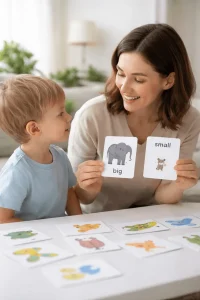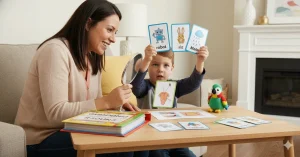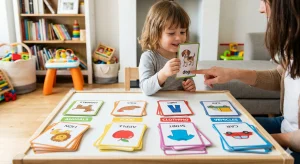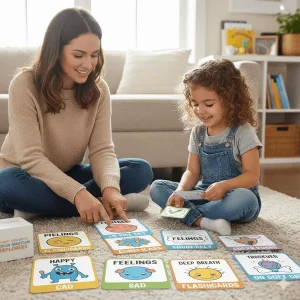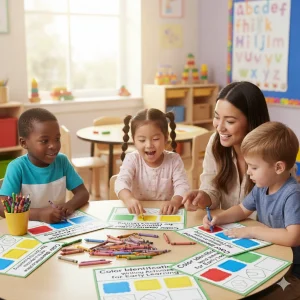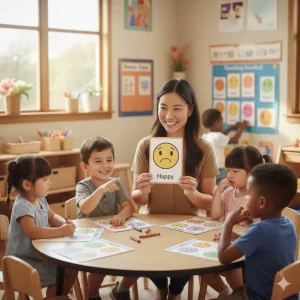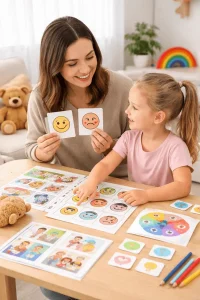Toddler Speech Delay: Why Mama or Dada Isn’t Said Yet
Last Updated: June 16, 2025
Toddler speech delay can be worrying — especially if your child isn’t saying words like “mama” or “dada” yet, while others their age seem to be chatting away. It’s normal to wonder, “Is this just a phase?” or “Should I be doing more?” The good news is, every child develops at their own pace — but knowing what signs to watch for can make a big difference.
The truth is, every child develops on their own timeline. Some toddlers are early talkers, while others take a little longer to find their voice. That doesn’t make you any less of a great parent — it just means your child might need a different pace or a bit more support along the way.
In this guide, we’ll walk you through:
- What speech and communication milestones are typical at this age
- Which signs may suggest a speech delay
- Simple, effective ways you can encourage speech at home
Get expert help from certified speech therapists — all online, personalized, and parent-friendly.
Start Your Child’s Speech Journey Today
Help Your Child Speak Better
Support your child’s speech, language, and confidence with personalized online therapy—fun, expert-led, and from home.
Speech and Communication Milestones at 12–18 Months
Wondering what’s “normal” when it comes to toddler speech? That’s a common question — especially if your child isn’t saying much yet. Between 12 to 18 months, many toddlers begin showing key signs of early communication. These don’t always mean full sentences or clear words, but rather small, meaningful ways of expressing themselves.
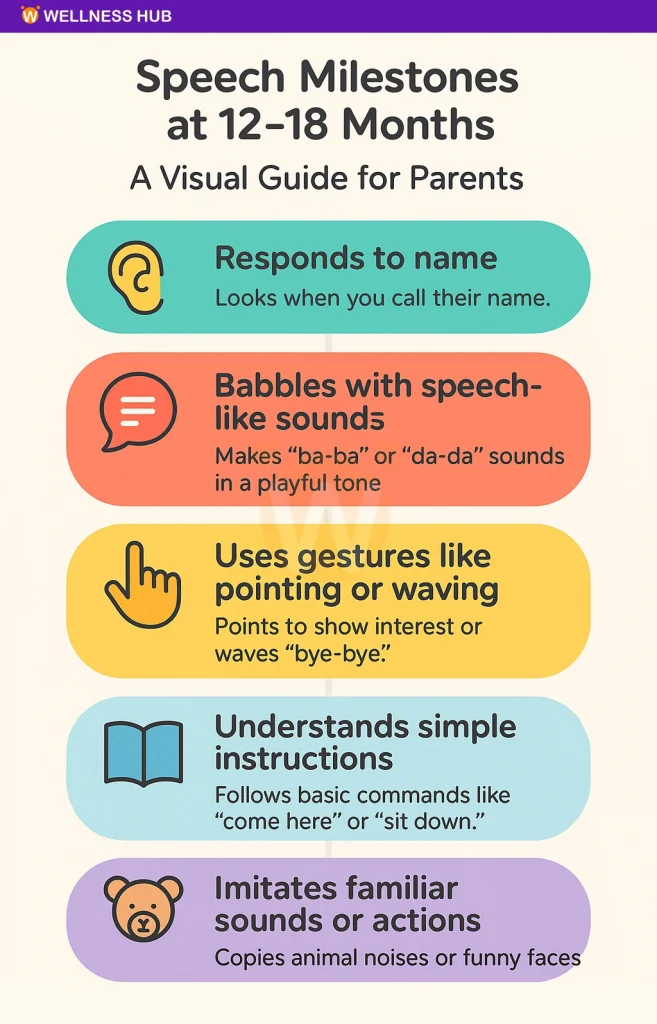
Here’s what most children in this age range typically start to do:
- Respond to their name — They turn their head or look at you when called.
- Babble using speech-like sounds — You might hear a mix of “ba-ba,” “da-da,” or playful chatter that sounds like they’re having a conversation.
- Say simple words like “mama” or “dada” — These may not always be clear, but consistent sounds with meaning begin to show up.
- Understand basic instructions — Short phrases like “come here,” “give me,” or “sit down” start to make sense.
- Point to things they want or notice — Whether it’s a toy, animal, or food item, pointing is a strong sign of connection and interest.
- Try to imitate sounds and words — Mimicking what they hear is an early step toward speech.
Read More: My Child Doesn’t Always Respond to Their Name
Red Flags That May Indicate a Delay
Every child develops at their own pace — but it’s also important to notice when something might need a closer look. If your toddler isn’t showing certain early communication signs by around 18 months, it could be an early indicator of a speech delay or developmental concern.
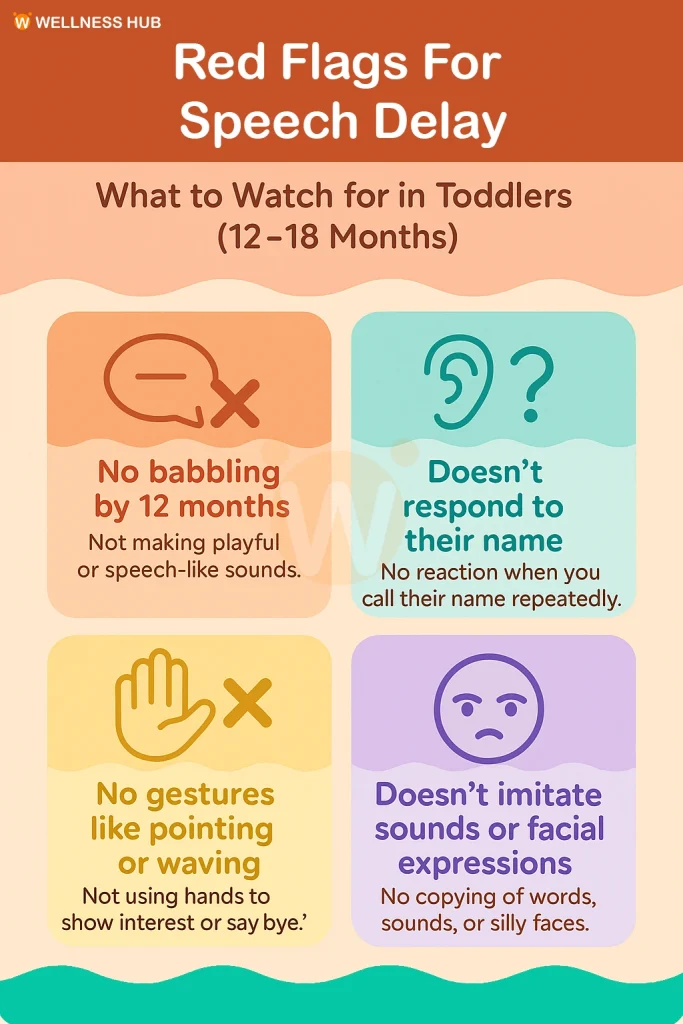
Here are some signs to gently watch for:
- Doesn’t respond to their name – Even after repeated calls, they don’t look up or react.
- No babbling or speech-like sounds – If you rarely hear playful noises like “ba-ba” or “da-da,” this might be a delay in expressive speech.
- Doesn’t use simple gestures – Waving bye-bye, pointing to things, or reaching out aren’t just physical actions — they’re key communication tools.
- Avoids eye contact or interactive play – Eye contact, smiling, and back-and-forth play show social connection. If these are missing, it’s worth exploring.
- Doesn’t imitate sounds, gestures, or facial expressions – Imitation is one of the earliest building blocks of learning how to speak.
- Seems uninterested in people or play – Limited interest in people, toys, or surroundings can sometimes signal deeper concerns.
How You Can Support Speech Development at Home
The good news? You don’t need fancy tools or special training to help your toddler start talking. Your everyday interactions — how you talk, respond, and play — are powerful tools in boosting your child’s speech and language development.
Here are some simple, effective ways to support your toddler at home:
1. Narrate Daily Routines
Talk through what you’re doing as you go about your day. For example:
“Now we’re brushing your teeth,” or “Let’s put on your shoes.”
This helps your child hear real-life words in real time, giving them context and meaning.
2. Read Picture Books Every Day
Choose books with colorful images and simple words. Use repetition and fun sounds.
Let your child turn pages, point to pictures, or even try to say the words with you.
3. Use Simple Gestures
Pair words with natural gestures. Wave and say “bye-bye,” or point and say “look!”
Gestures make language more visual and easier to understand.
4. Encourage Imitation
Make silly sounds, animal noises, and animated faces.
Say “moo” like a cow, or make a big surprised face — and encourage your toddler to copy you.
5. Limit Screen Time
Interactive play beats passive watching. Real conversation — even if it’s one-sided at first — helps your toddler learn how to respond, take turns, and build connections.
Lear More: What Does It Mean If My Baby Doesn’t Engage in Joint Attention?
When Expert Help Makes the Difference
Sometimes, even with your best efforts at home, your child may need a little extra support — and that’s okay. Knowing when to bring in a speech therapist can be the key to unlocking real progress.
At Wellness Hub, we offer expert-led, online speech therapy designed specifically for toddlers and young children — all from the comfort of your home. No travel, no waiting rooms — just personal care that fits into your daily routine.
Here’s how we help:
- Licensed Speech Therapists – Work 1-on-1 with experienced professionals who specialize in early speech delays.
- Personalized Support – Every child is unique. Our therapists create custom plans that match your child’s pace and needs.
- Therapist-Guided App – App like our BASICS help you check developmental milestones in minutes.
- Culturally-Aware Care for Indian Families Worldwide – We understand the values, languages, and parenting styles familiar to Indian families — no awkward translations or explanations needed.
Every Child is Unique – Early Action Builds Confidence
It’s easy to compare your child to others — especially when one toddler is speaking in full sentences and another is still silent. But remember: every child’s path is different, and that’s perfectly okay.
Some children start talking early, while others need more time or support to get there. It doesn’t mean anything is “wrong.” It just means their journey is unfolding in its own way.
What matters most is noticing when your child might need a little help — and taking that step early. In fact, early support can prevent long-term challenges with communication, behavior, and learning.
If you’ve had a gut feeling that something might be off, trust it. You’re not overreacting. You’re paying attention — and that’s a strength, not a flaw.
Conclusion
If you’re feeling unsure, worried, or just overwhelmed — take a deep breath. You’re doing a great job by simply paying attention to your child’s speech development. The fact that you’re here, reading, and exploring your options already shows how much you care. You’re not alone in this. So many parents quietly share the same concerns — and the good news is, help is available, and it’s easier to access than you might think. At Wellness Hub, we believe that early action isn’t a sign of failure — it’s a sign of love and strength. Whether your toddler is just a little behind or needs more structured support, our team is here to guide you — without judgment, pressure, or confusion.
Frequently Asked Questions:
1. Is it normal if my 1-year-old doesn’t say “mama” or “dada”?
Yes, some toddlers take more time to speak. But if your child isn’t using any words or sounds by 12–15 months, it’s good to check in with a speech expert.
2. When should I worry about a speech delay?
If your toddler doesn’t respond to their name, isn’t babbling, or doesn’t use gestures like pointing or waving by 18 months, talk to a speech therapist. Early help really works.
3. What are the early signs of speech delay in toddlers?
Look for these signs: no babbling, no words by 16 months, not pointing, poor eye contact, and not following simple commands like “come here.”
4. What’s the difference between a late talker and a speech delay?
Late talkers may start speaking later but catch up on their own. Children with speech delay may need therapy because they also show other signs like poor social interaction or no gestures.
5. Can I help my toddler talk at home?
Yes! Talk often, read daily, use simple gestures, and encourage your child to copy sounds.
6. Does screen time affect speech in toddlers?
Yes, too much screen time can reduce how much your child listens, talks, and interacts. Real conversations are much better for speech growth.
7. How does online speech therapy work for toddlers?
Your child meets with a licensed speech therapist through video calls. It’s fun, play-based, and done from your home — perfect for young children and busy parents.
8. Is online speech therapy as effective as in-person?
Yes! Many families see great results. It’s interactive, customized, and works well when parents stay involved.
9. What is the BASICS screener from Wellness Hub?
It’s a free, therapist-designed tool to help parents check their child’s speech and development milestones in minutes.
10. Should I wait or talk to someone now?
Don’t wait. If you have even a small concern, it’s better to check. Early support makes a big difference — and it’s free to start.
About the Author:
Shilpa Deshpande
Shilpa Deshpande is a skilled speech-language pathologist with over 14 years of experience. Fluent in Kannada, Telugu, Hindi, and English, she specializes in parent counseling, speech sound disorders, fluency assessment, and speech-language evaluations. Shilpa excels at working with children with developmental disorders, offering creative and effective therapy programs. Currently, at Wellness Hub, she holds a BASLP degree and is registered with the RCI. Her patience, ambition, and dedication make her a trusted expert in her field.
Book your Free Consultation Today
Parent/Caregiver Info:
Client’s Details:
* Error Message
